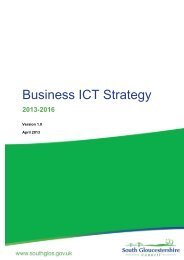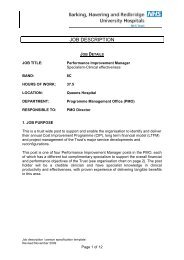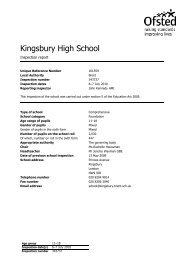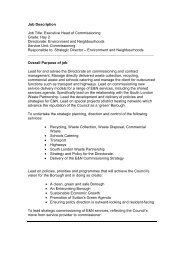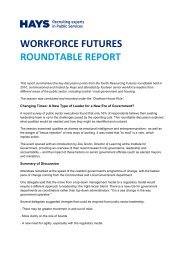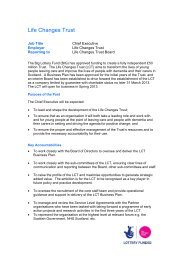RESOURCING AND TALENT PLANNING - Hays
RESOURCING AND TALENT PLANNING - Hays
RESOURCING AND TALENT PLANNING - Hays
You also want an ePaper? Increase the reach of your titles
YUMPU automatically turns print PDFs into web optimized ePapers that Google loves.
2012<br />
• Managers and professionals and technical<br />
positions were the most difficult vacancies<br />
to fill.<br />
• As in previous years, the main reason for<br />
recruitment difficulties was a lack of necessary<br />
specialist or technical skills.<br />
Employing younger workers<br />
• A quarter of organisations report they are<br />
employing more 16–24-year-olds compared with<br />
one year ago.<br />
• Nearly one-third of organisations operate a<br />
structured graduate recruitment programme.<br />
Their use has increased in larger organisations<br />
compared with previous years as well as in the<br />
manufacturing and production sector generally.<br />
• Two-fifths of organisations are concerned<br />
that the increase in university tuition fees will<br />
make it harder to get the skills they need (rising<br />
to half of those with graduate recruitment<br />
schemes).<br />
• Apprenticeships are offered by two-fifths<br />
of organisations overall, with a further 14%<br />
planning to introduce them in the next 12<br />
months. Twenty-eight per cent offer intern<br />
schemes and 15% sponsor students through<br />
university.<br />
• Nearly half (46%) of organisations across all<br />
sectors report that if their organisation offered<br />
more apprenticeship programmes it would help<br />
them get the skills they need.<br />
Resourcing in turbulent times<br />
• Half of the organisations surveyed report that<br />
the economic climate has had a negative impact<br />
on their organisation’s resourcing budgets for<br />
2012–13. The public sector is most likely to<br />
report reductions.<br />
• Talent management budgets do not appear to<br />
have been hit as much as resourcing budgets.<br />
Just one in ten report that their overall talent<br />
management spend has decreased in the last<br />
12 months, while a quarter reported spend<br />
had increased. Half of organisations report the<br />
current economic situation has actually led to<br />
an increased focus on talent management.<br />
• Changes in resourcing and talent practices in<br />
2012 compared with 2011 reflect a stronger<br />
focus on costs and reductions in budgets. More<br />
organisations anticipate they will be focusing<br />
on developing talent in-house, retaining rather<br />
than recruiting talent, redeploying people<br />
into new roles and reducing their reliance on<br />
recruitment agencies and external consultants<br />
for resourcing and development.<br />
• More than one-quarter report they will be<br />
reducing the number of new recruits they<br />
hire in 2012 and a fifth (19%) implementing a<br />
recruitment freeze.<br />
• At the same time, however, more organisations<br />
report they will be recruiting for key talent/niche<br />
areas in 2012 (60%) compared with 2011 (50%).<br />
The findings also suggest that more time and effort<br />
will be invested in the quality of candidates hired.<br />
• Nearly three-quarters (71%) report that they<br />
have noticed an increase in the number of<br />
unsuitable applicants, while three-fifths report<br />
that competition for talent is greater now.<br />
The impact of the 2012 Olympic Games<br />
• Overall, more than one-quarter of organisations<br />
report that they will be allowing employees time<br />
off to volunteer for the 2012 Olympic Games.<br />
• Half of organisations are implementing<br />
particular resource planning practices for the<br />
2012 Olympics. Nearly one-third report they<br />
will be reminding employees of existing flexible<br />
working opportunities and making TVs available<br />
in the workplace, while more than one-quarter<br />
report they will try to accommodate requests to<br />
work from home.<br />
Diversity<br />
• Overall, in little change from previous years,<br />
just over half of organisations have a diversity<br />
strategy, rising to 89% of public sector<br />
organisations.<br />
• This year we saw usage of diversity practices<br />
return to 2010 levels. Last year we had noted a<br />
reduction in the use of some methods, possibly<br />
as a result of the pressures of the economic<br />
downturn focusing attention elsewhere.<br />
<strong>RESOURCING</strong> <strong>AND</strong> <strong>TALENT</strong> <strong>PLANNING</strong> 2012<br />
5




